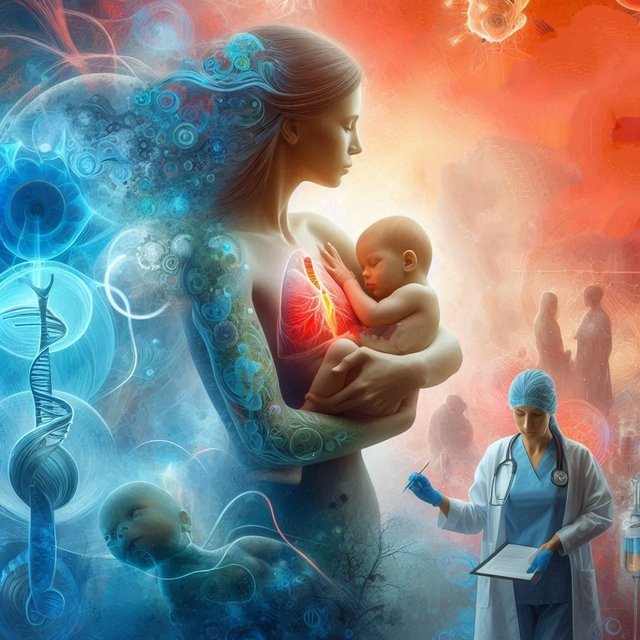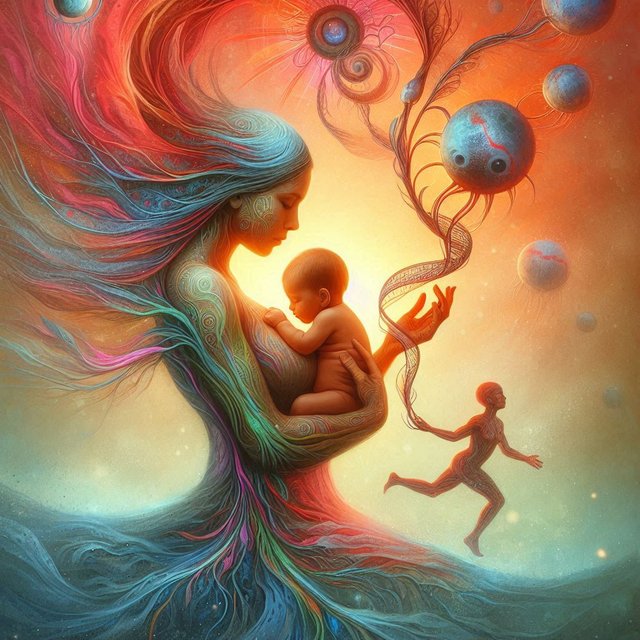The Legacy of Trauma: Does It Have the Potential to Shape Future Generations?

During those early days, there was a lot of adjusting, changing my lifestyle according to theirs, and dealing with a lot of judgment. I felt alone and couldn't live by my own choices. My body was going through many changes, with hormones creating chaos. To top it off, I had morning sickness and was vomiting around the clock.
Now, looking back, I don't understand how I endured it. Actually, I do - by letting it take its toll on my mental wellbeing. Sometimes, it's not about the people around you, their goodness or badness; sometimes, it's the circumstances. It's about them experiencing you for the first time in their lives, the rigidity of conforming to societal standards, and thinking that their way is the only right way. In my case, it was the pressure from society to prove to be a good wife and daughter-in-law, to paint that rosy picture that all is well in paradise.
While writing this, I am reminding myself not to be the cause of someone's troubles, to the point where it affects their offspring. Indeed, up till now, @remlaps must be wondering why I am ranting and venting about such personal matters in his scientific community!
Ever since I read an article that kept appearing on my Google homepage, like asking me, Can trauma be inherited through genes? A life-altering experience “doesn’t just die with you,” one expert says. “It has a life of its own afterwards.”, I couldn't help but ponder. And I couldn't hold it any longer now, so here I am!!!
This line hit me the hardest It has a life of it's own afterwards.

I've been somewhat agitated since reading this. What if some of my traumatic experiences, especially during pregnancy, have been transferred? Then I started wondering what traits I might have inherited from my own mother. Oddly, the paternal genetic makeup doesn't bother me much because, as I understand it, the transfer isn't due to altering genetic makeup or DNA directly. It's more of an epigenetic process, where certain genes are switched on or off. This leads me to imagine that only a mother could pass on such chemical marks on her genes to her offspring.
In the same article, it is quoted:
For some people, the concept that we can carry a legacy of trauma makes sense because it validates their sense that they are more than the sum of their experiences.
A 2018 review There's evidence in this, suggesting a connection between intergenerational trauma and depression. Researchers have found that trauma can be passed down between generations through epigenetic mechanisms. This means that the trauma experienced by ancestors could influence how your genes are expressed.
We need to understand here the difference between genetics and epigenetics, and the changes brought about by these two entities.
Epigenetics refers to the way your behaviors and environment can cause changes that affect the way your genes work. Epigenetics turns genes "on" and "off." It's more like altering not our DNA sequence, but how it’s read and utilized.
Your Epigenetics change as you age, both as part of normal development and aging and because of exposure to environmental factors that happen over the course of your life. Epigenetic changes can affect your health in different ways.
In simple terms, it's about genes being activated or deactivated based on circumstances. This is where my concern or agitation lies. Can trauma, if present, influence the expression of certain genes? What are the effects of acute and chronic stress on this process?
And I am certainly not wrong because it is researched that during pregnancy, factors like a pregnant individual's environment and behavior, such as their diet, can alter the baby's epigenetics. Some of these modifications can persist for decades and may increase the child's susceptibility to certain diseases.
It's not that I'm unfamiliar with the concept; rather, it's not new to me. I did know about it before. Forget about scientific research, heaps of information, stats, and journals supporting this idea. It's something we've been hearing from our ancestors and elders: "You should try to be happy during those days when you are nurturing a new life inside you." But you can also have to hear something like this: "Being pregnant is very much the same as it always has been. What's new? We were like this, like that..."
Words like these make you doubt your own strength. They make you think that maybe it's only you feeling everything with such intensity. What's the big deal? You are not the first and certainly not the last to become a mother or experience those feelings of helplessness.

Did you throw up for the same number of times? Did you live in a joint family? Did you have to get accustomed to the eating habits and timings of those living with you? Or were you a queen in your house just like you are now? If I could say all those words to them then, would it make any difference? Maybe, but chances are slim!
So it's crucial to understand that everyone's circumstances are different. But one thing is the same: the tension does release cortisol, it affects your and your baby's health. It can affect the offspring epigenetically.
Why did I choose to correlate the epigenetic impact of trauma with the topic of "stress versus happiness" during pregnancy? This serves as a hope and a reminder to myself and anyone who may find themselves in a position of power, whose actions can bring about unrest. If you have the potential to cause turmoil, tension, or negative feelings for another person, especially a woman, please bear in mind that you are responsible not only for your actions toward her but also for the impact on future generations. Your actions could influence the activation or deactivation of certain genes in her DNA, as well as the might to push all the wrong buttons. Yes you have this much power! Please be mindful! Please live and let live!
And for those who argue that stress can be natural or from an accident, let me clarify... An acute stressor can never inflict the same epigenetic damage as a chronic one, whether this stress comes from war, a holocaust, or a source as trivial as societal pressures. No acute event can match the generational impact of chronic stress. The prolonged nature of these stresses has the ability to shape generations, wreak havoc on their genetic structures, and leave lasting chemical marks for future generations to inherit.
Something to ponder about!
For me, for you, for every damn person on planet earth!

Edit: @bambuka has a very unique perception and point of view regarding this topic:
Ты поднимаешь довольно сложный вопрос.
Я отвечу тебе на русском языке, так как не уверен, что перевод будет точным с моей стороны.
Я хочу поделиться с тобой своим опытом. Нет, я не имел возможности вынашивать ребёнка в своём чреве :)
Но у меня был период в "прошлой жизни" когда я работал с последствиями психологических травм у разных людей. Так вот.
Не буду говорить про генетику, но на неё порой навешивают проблемы, которые не всегда имеют к ней отношение. Легче объяснить проблему человека, сказав, что "у тебя отягощённая генетика". Это солидно и снимает необходимость глубокой проработки травмы. Это похоже на отговорки (да простят меня истинные генетики))
Когда из поколения в поколение передаются некоторые паттерны поведения, психосоматика - это не обязательно генетика, но обязательно психологическая травма, которая записана в подсознание. Эта травма оказывает влияние на жизнь после травмы. Это влияние проявляется в поведении, реакциях, самочувствии, выходит на уровень психосоматики, "наследственных" болезней. Но источником всего этого (передающегося детям, внукам, ... почитай Эрика Берна "Игры, в которые играют люди...) является непроработанная травма засевшая в подсознании.
Длительный стресс способен хорошо подкреплять начальную травму, сделать её "защищённой и устойчивой". А дальше ... дети копируют родителей и генетика может отдыхать, психика хорошо справится и сама...
И ещё.работая с подсознанием людей я обнаружил, что "первые воспоминания" связаны с внутриутробным периодом. Мы помним даже момент зачатия. Более того, мы помним опыт своих прошлых жизней. Не совсем помним, конечно, в том смысле, что эти записи подсознания недоступны нашему сознанию по его желанию. Но эта запись у нас есть.
И это не генетика.
Ты поднимаешь довольно сложный вопрос.
Я отвечу тебе на русском языке, так как не уверен, что перевод будет точным с моей стороны.
Я хочу поделиться с тобой своим опытом. Нет, я не имел возможности вынашивать ребёнка в своём чреве :)
Но у меня был период в "прошлой жизни" когда я работал с последствиями психологических травм у разных людей. Так вот.
Не буду говорить про генетику, но на неё порой навешивают проблемы, которые не всегда имеют к ней отношение. Легче объяснить проблему человека, сказав, что "у тебя отягощённая генетика". Это солидно и снимает необходимость глубокой проработки травмы. Это похоже на отговорки (да простят меня истинные генетики))
Когда из поколения в поколение передаются некоторые паттерны поведения, психосоматика - это не обязательно генетика, но обязательно психологическая травма, которая записана в подсознание. Эта травма оказывает влияние на жизнь после травмы. Это влияние проявляется в поведении, реакциях, самочувствии, выходит на уровень психосоматики, "наследственных" болезней. Но источником всего этого (передающегося детям, внукам, ... почитай Эрика Берна "Игры, в которые играют люди...) является непроработанная травма засевшая в подсознании.
Длительный стресс способен хорошо подкреплять начальную травму, сделать её "защищённой и устойчивой". А дальше ... дети копируют родителей и генетика может отдыхать, психика хорошо справится и сама...
И ещё.работая с подсознанием людей я обнаружил, что "первые воспоминания" связаны с внутриутробным периодом. Мы помним даже момент зачатия. Более того, мы помним опыт своих прошлых жизней. Не совсем помним, конечно, в том смысле, что эти записи подсознания недоступны нашему сознанию по его желанию. Но эта запись у нас есть.
И это не генетика.
0.00 SBD,
18.53 STEEM,
18.53 SP,
0.00 TRX
Can I include your reply in my main text? If you permit!
Of course you can:)
To make things even more complicated, we might add that it's not even primarily about the things a mother passes on to her child while she's pregnant. Although this connection seems the strongest and most logical. Well, what is logical in our lives anyway?
One can be influenced by many other members of the family and the entire kin. Even people he didn't know, never met, might not have heard of. Big family secrets lend themselves to a forgotten relative suddenly coming to light through a child starting to live his/her life anew. Well, one can even experience the life of one's grandfather's jilted fiancee and whatnot. Rejected people, murders, crimes, secrets and not only - as you yourself write, experiences of wars and any other traumatic, external circumstances that are not related to the family, all this affects a person in his next life without him knowing it.
But you should not be troubled by thoughts like: then I could have lived in a different place, in a different way, I could have done something differently. You see the world is a playground where everything seems to be planned and set long before a person is born. And the trauma is constantly fueled and created again and again. Why don't wars stop, for example? One would say, we are "rational" beings, why should we go to war, kill each other? Even if a person is very careful in their actions, and they should be, and passes on a wonderful legacy to their children and grandchildren, there must be other circumstances to perpetuate the trauma.
Well, I've gone off topic a bit, but that's because just one comment can't cover everything on this complex subject.
0.00 SBD,
3.72 STEEM,
3.72 SP,
0.00 TRX
You have not gone off-topic, not even a bit! Actually, while writing this article, I thought, "What the actual heck? How will I cover everything under this very heading?" I may have touched a very tiny part of this complex debate. I mean, after completing the whole thing, I thought to myself, it seems more like a rant. But I could only talk from my personal experience. Do you know, or maybe you sensed, that I left out a very important detail? When I started my first paragraph, I told you about an experience and then I encountered the same event two more times in my life with somewhat different outcomes. She bears that melancholy (or maybe I'm being overly sentimental) that I bore during that period. I would cry insistently. That was the main reason to include my personal perspective, but it definitely turned into a vent!
Yes, yes, a hundred times yes! I have seen things and I'm in awe of how some people resurface again in another body and form.... Isn't it amazing???
Agreed! Or as I said:
It has a life of it's own...
I was only wondering if this trauma can linger in the minds of future generations. My heart says a big fat yes ...
0.00 SBD,
0.09 STEEM,
0.09 SP,
0.00 TRX
TEAM 5
If a first born daughter has anger issues like her father, but of course when a trigger is met, can we say it's due to epigenetic?
I always think diabetes is a good example of epigenetic. The genes to cause it is always present in the body(if inherited by the parents), but it will cause any harm when a person lives in a bad environment with stress while eating processed food.
In short, a trigger is required in some cases.
I remember my mother recalling her first pregnancy bearing me, everything was going fine but during the last days her bp was high and they had to go for C-section, while all her other children had vaginal delivery.
She had traumas given by her in-laws and she told me about this a few years ago, a mother daughter talk
I was so ashamed yet so proud of her for bringing us in this world with traumas during her early marriage life.
You know what is the condition now? I have the same fears for my future as well.
I don't know if it is due to epigenetic or a talk she had with me🙂
0.00 SBD,
2.16 STEEM,
2.16 SP,
0.00 TRX
First of all, I would like to address this concern of yours. Please don't think like this. It's okay to be fearful or have negative thoughts, but you can never limit yourself because of this fear. Why would you? Maybe your mom shouldn't have had this talk with you; I don't know. I think my mother shouldn't have had some talks with me either. We are naïve and fragile in front of our parents, but they are also human beings at the end of the day. However, I have resolved never to let my children bear the burden of my worries.
Please do not indulge in unnecessary worries and troubles. I hope and pray that you have a very fulfilling life ahead.
And also look at @bambuka's reply in comments
Hmmm
You're right. Worrying is not gonna bring any goodness.
Maybe when parents had enough burden they tend to share some with their children. I don't know if that is good or not, only a parent call tell.
But you know what, i just look at all such women who managed to survive and ignored the toxicity of the people they couldn't escape physically.
It's impossible to practice this kind of courage in this world today.
Ameen. Thank you Maan❣
I've seen it. He is such a calm and composed person. Always get serene vibes from his thought process,🤝
thank you for sharing such a great narrative, I was reminded of a case of Baby Blues Syndrome due to economic pressure and the husband's lack of knowledge of his wife's mental health that happened in my area.
0.00 SBD,
0.03 STEEM,
0.03 SP,
0.00 TRX
Thank you for your comment!
My point here isn't specifically about the baby blues, though that is indeed a very serious issue related to pregnancy and trauma. My main focus is on the transmission of traumatic markers from one generation to the next, through epigenetics. This topic is still under research, and concrete conclusions have yet to be established, which is why there’s some uncertainty and hence the question mark in the title!
The reason I brought this up today wasn’t to point fingers at anyone specifically. Rather, I spoke from personal experience to highlight that there are numerous factors contributing to trauma, whether subtle or overt. My question is: if someone goes through such experiences, is there a tendency for this trauma to be passed on to the next generation?
You've got a free upvote from witness fuli.
Peace & Love!
Your post is manually rewarded by the
World of Xpilar Community Curation Trail
STEEM AUTO OPERATED AND MAINTAINED BY XPILAR TEAM
https://steemit.com/~witnesses vote xpilar.witness
"Become successful with @wox-helpfund!"
If you want to know more click on the link
https://steemit.com/@wox-helpfund ❤️
Pregnancy is often portrayed as a time of joy and anticipation, yet for many, it is also a period marked by profound stress and emotional turmoil. Your experience of balancing academic responsibilities, adjusting to a new family dynamic, and dealing with your husband's absence while living with in-laws shows all of the issues that many women confront. The pressure to conform to societal standards and prove oneself as a good wife and daughter-in-law can be overwhelming, often leaving little room for personal well-being. I'm Pakistani and I can feel everything that you have experienced.